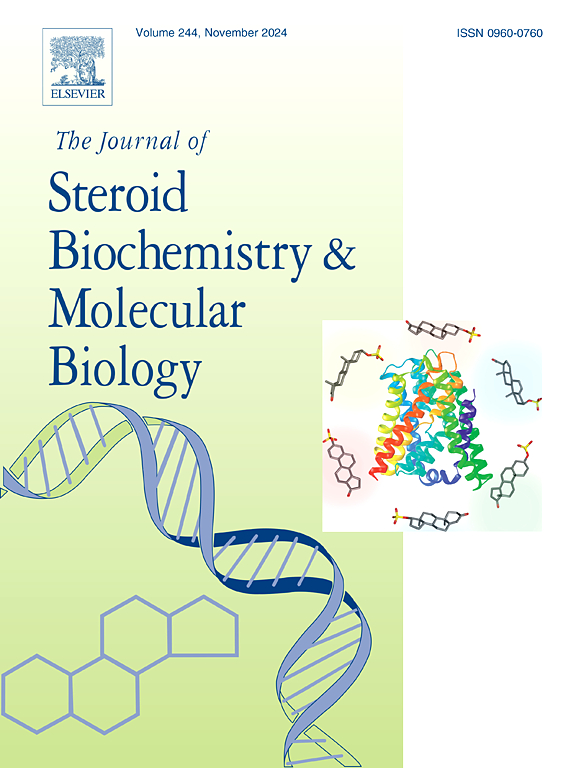7-ketocholesterol as a critical oxysterol: Impact on human health and safety in food systems
IF 2.5
2区 生物学
Q3 BIOCHEMISTRY & MOLECULAR BIOLOGY
Journal of Steroid Biochemistry and Molecular Biology
Pub Date : 2025-09-05
DOI:10.1016/j.jsbmb.2025.106856
引用次数: 0
Abstract
7-Ketocholesterol (7-KC) is a biologically active oxysterol formed through the oxidation of cholesterol, predominantly under conditions of oxidative stress. It is generated both enzymatically in specific tissues such as the brain and liver, and non-enzymatically via reactive oxygen species (ROS), especially in aging tissues and heat-processed animal-derived foods. 7-KC exerts multifaceted effects on human health, extending beyond lipid metabolism to disrupt glucose and amino acid utilization, impair mitochondrial function, and provoke endoplasmic reticulum (ER) stress. These disturbances contribute to chronic inflammation and oxidative damage, playing pivotal roles in the development of various diseases, including atherosclerosis, neurodegenerative disorders, diabetes, cancer, hepatic steatosis, and ocular and gastrointestinal pathologies. Additionally, 7-KC is a marker of cholesterol oxidation in the food industry, where it signals product degradation and potential toxicity in long-stored or thermally processed animal-based foods. This review explores the biosynthesis, metabolic fate, and pathophysiological role of 7-KC, highlighting its critical role in intermediary metabolism, disease progression, and food safety. Furthermore, it outlines mitigation strategies to reduce 7-KC exposure through dietary modifications, antioxidant interventions, and advanced food processing technologies aimed at enhancing public health.
7-酮胆固醇作为一种重要的氧化固醇:对食品系统中人类健康和安全的影响。
7-酮胆固醇(7-KC)是一种具有生物活性的氧甾醇,主要是在氧化应激条件下通过胆固醇氧化形成的。它可以在特定组织(如大脑和肝脏)中酶促产生,也可以通过活性氧(ROS)非酶促产生,特别是在老化组织和热加工的动物源性食品中。7-KC对人体健康具有多方面的影响,不仅限于脂质代谢,还可破坏葡萄糖和氨基酸的利用,损害线粒体功能,并引起内质网(ER)应激。这些紊乱导致慢性炎症和氧化损伤,在各种疾病的发展中起关键作用,包括动脉粥样硬化、神经退行性疾病、糖尿病、癌症、肝脂肪变性、眼部和胃肠道病变。此外,在食品工业中,7-KC是胆固醇氧化的标志,在长期储存或热加工的动物性食品中,它标志着产品降解和潜在毒性。本文综述了7-KC的生物合成、代谢命运和病理生理作用,重点介绍了7-KC在中间代谢、疾病进展和食品安全中的重要作用。此外,它还概述了通过饮食调整、抗氧化干预和旨在加强公众健康的先进食品加工技术来减少7-KC暴露的缓解战略。
本文章由计算机程序翻译,如有差异,请以英文原文为准。
求助全文
约1分钟内获得全文
求助全文
来源期刊
CiteScore
8.60
自引率
2.40%
发文量
113
审稿时长
46 days
期刊介绍:
The Journal of Steroid Biochemistry and Molecular Biology is devoted to new experimental and theoretical developments in areas related to steroids including vitamin D, lipids and their metabolomics. The Journal publishes a variety of contributions, including original articles, general and focused reviews, and rapid communications (brief articles of particular interest and clear novelty). Selected cutting-edge topics will be addressed in Special Issues managed by Guest Editors. Special Issues will contain both commissioned reviews and original research papers to provide comprehensive coverage of specific topics, and all submissions will undergo rigorous peer-review prior to publication.

 求助内容:
求助内容: 应助结果提醒方式:
应助结果提醒方式:


